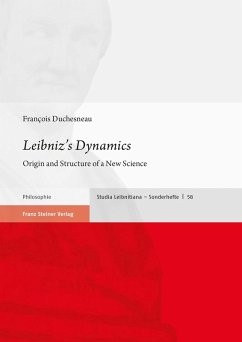Gottfried Wilhelm Leibniz (1646-1716) launched a new science dedicated to the theory of force. His 'dynamics' is an important episode in the history of the scientific revolution. Its starting point has been a particular theory of the combination of motions placed within the framework of a mechanistic natural philosophy. Its turning point was Leibniz's discovery in 1678 of a new principle later known as principle of conservation of live force, which he proposed in 1686 as replacement for Descartes' principle of conservation of quantity of motion. In Dynamica de potentia (1689-90), Specimen dynamicum (1695), Essay de dynamique (ca. 1700), and various pieces of correspondence, Leibniz applied his creative methodology, fostered original scientific models and hypotheses, and refined demonstrative arguments in support of his theory. As a result, the dynamics would comprise the conceptual and architectonic fundamental elements for a revised 'system of nature'. Our endeavor has been to unveil the genesis and explain the makeup of this Leibnizian scientific and philosophical achievement. François Duchesneau is Emeritus Professor of Philosophy at the Université de Montréal. His fields of expertise are early modern philosophy, history and philosophy of science, Leibniz's philosophy and science.
Dieser Download kann aus rechtlichen Gründen nur mit Rechnungsadresse in A, B, BG, CY, CZ, D, DK, EW, E, FIN, F, GR, HR, H, IRL, I, LT, L, LR, M, NL, PL, P, R, S, SLO, SK ausgeliefert werden.









